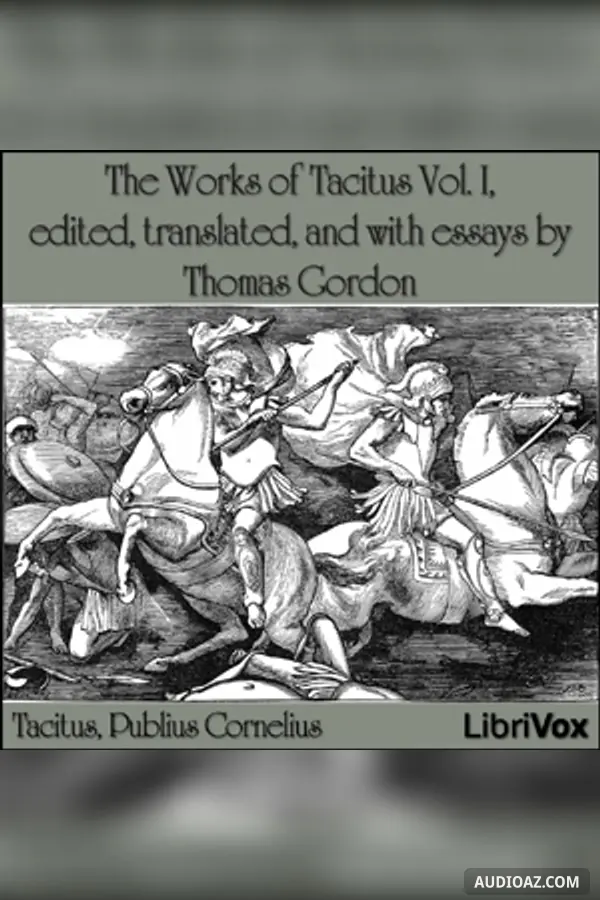
Works of Tacitus, Vol. I - Free Audiobook
Author(s): Publius Cornelius TacitusThomas Gordon
Language: English
Genre(s): HistoryNon-fiction
1 / 29Dedication to Sir Robert Walpole
- 1. Dedication to Sir Robert Walpole
- 2. Discourse I: Upon Former English Translations of Tacitus
- 3. Discourse IIa: Upon Tacitus and His Writings
- 4. Discourse IIb: Upon Tacitus and His Writings
- 5. Discourse III: Upon Caesar the Dictator
- 6. Discourse IV: Upon Octavius Caesar, Afterwards Called Augustus
- 7. Discourse Va: Of Governments Free and Arbitrary
- 8. Discourse Vb: Of Governments Free and Arbitrary
- 9. Discourse VI: Of the Old Law of Treason
- 10. Discourse VIIa: Of the Accusations and Accusers Under the Emperors
- 11. Discourse VIIb: Of the Accusations and Accusers Under the Emperors
- 12. Discourse VIII: Of the general Debasement of Spirit and Adulation which accompany Power unlimited
- 13. Discourse IX: Upon Courts
- 14. Discourse X: Of Armies and Conquest
- 15. The Annals Bk. 1: The Reign of Augustus
- 16. The Annals Bk. 1: Tiberius Takes the Throne
- 17. The Annals Bk. 1: The Sedition at Pannonia
- 18. The Annals Bk. 1: The German Insurrection
- 19. The Annals Bk. 1: The Rise of Germanicus
- 20. The Annals Bk. 2: Conflict in Armenia
- 21. The Annals Bk. 2: Libo's Rebellion
- 22. The Annals Bk. 2: Debates in the Senate
- 23. The Annals Bk. 2: Various Rebellions
- 24. The Annals Bk. 2: The African Conflicts
- 25. The Annals Bk. 2: The Death of Germanicus
- 26. The Annals Bk. 3: The Disgrace of Piso
- 27. The Annals Bk. 3: Conflict with the Upper Classes
- 28. The Annals Bk. 3: Tiberius Pleads with the Senate
- 29. The Annals Bk. 3: International Relations Under Tiberius
About
The historical works of Tacitus are a history of the period from A.D. 14 to 96 in thirty volumes. Although many of the works were lost (only books 1-5 of the Histories and 1-6 and 11-16 of the Annals survive), enough remains to provide a good sense of Tacitus’s political and moral philosophy.
He recognized the necessity for strong rulers but argued that more should be done to manage the succession of power and allow for the ascension of talent. Tacitus asserted that it was the dynastic ambitions of Rome’s many emperors that caused the decline of moral and political life and precluded the possibility of recruiting leaders of real ability. Moreover, the dynastic temptation caused political instability because military force was now required for political change. His works point to the necessity of systematic institutional restraints on power for the preservation of liberty.
Gordon’s translation and his lengthy Discourses on Tacitus bring Tacitus’ ideas up to date and apply them to the British state of the early 18th century. (Description from Online Library of Liberty)
Comments
Be the first to comment
There aren't any comments on this content yet. Start the conversation!
Discover More
Tags: Works of Tacitus, Vol. I audio, Works of Tacitus, Vol. I - Publius Cornelius Tacitus, Thomas Gordon audio, History audio, Non-fiction audio, free audiobook, free audio book, audioaz






